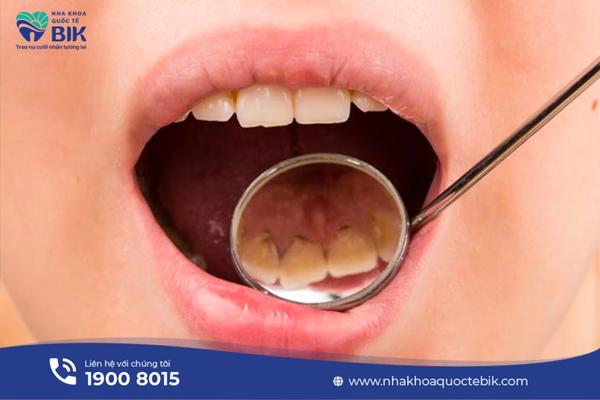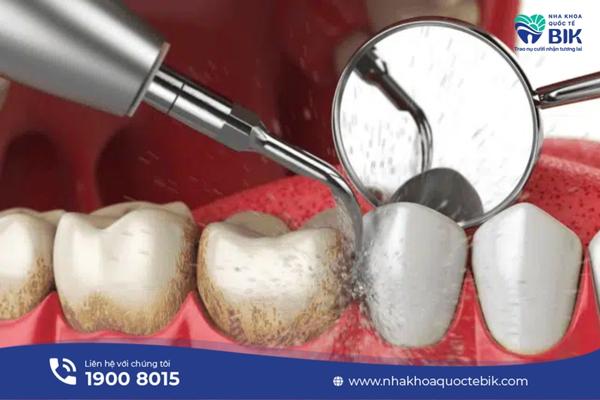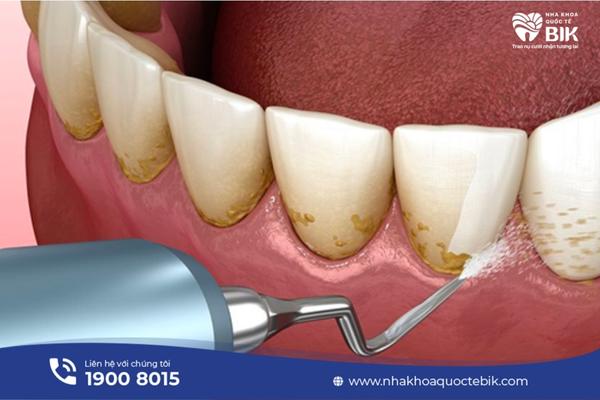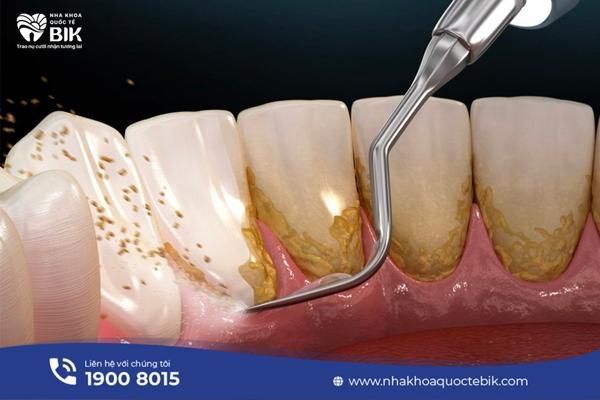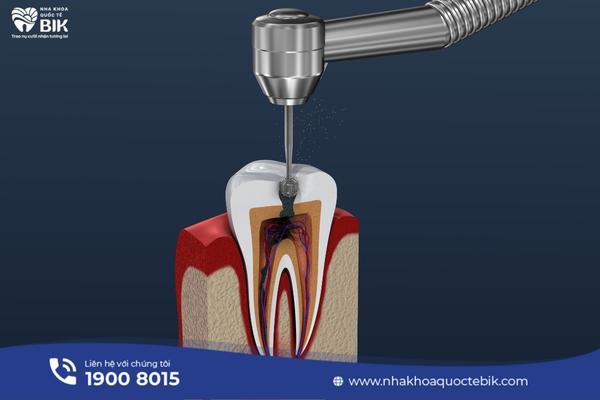Swollen gums are a common disease today. The cause of swollen gums can come from infection, pregnancy, wisdom teeth, etc. To know more about the causes and treatment of this disease, let’s find out with BIK International Dental Clinic through the following article!
1. What is swollen gums?
Swollen gums, also known as swollen gums, is a common disease caused by many different causes. However, swollen gums are quite easy to treat. The best way to treat swollen gums is to detect signs of swollen gums and then find out the cause of swollen gums. Next, focus on treating swollen gums and following preventative measures to protect your teeth.
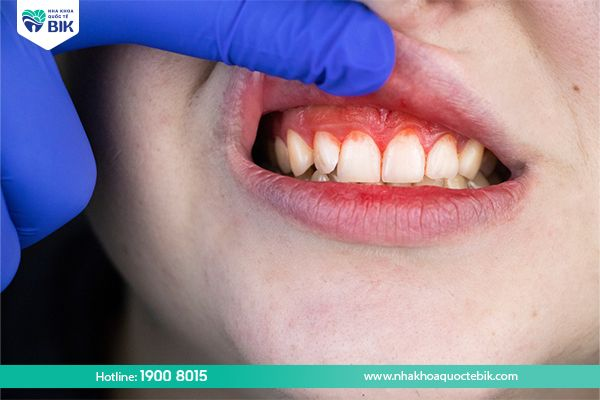
2. Signs of swollen gums
Some signs when patients have swollen gums are easy to detect such as:
– Gums change from natural light pink to darker red.
– Gums are swollen, painful, and sensitive: Swollen gums can make the gums more swollen than normal and when eating, the patient will feel a sharp, painful sensation.
– When brushing teeth, using dental floss or biting hard foods, the gums will bleed.
– Long-term bad breath: When the gums are swollen, bacteria can grow stronger, causing an unpleasant odor in the mouth.
– Gums are receding or not attached to the tooth roots.
If the patient experiences severe gum swelling and severe pain for a long time, go to a dental clinic for examination to avoid more serious complications such as gingivitis and periodontitis.

3. Causes of swollen gums
According to dental experts, swollen gums are caused by the following main reasons:
3.1. Swollen gums due to inflammation
Gingivitis is the leading cause of swollen gums. Gingivitis is often caused by poor oral hygiene habits that cause plaque to accumulate. Plaque is a film of bacteria, water and polysaccharides. If not cleaned early, plaque will harden and become tartar.
Usually, the symptoms of swollen gums can be mild and are rarely treated. However, if gingivitis is not treated early, this disease can lead to more serious conditions such as periodontitis.
3.2. Due to pregnancy
Why do pregnant women have swollen gums? According to experts, during pregnancy, a woman’s body will experience hormonal changes. Hormonal changes during pregnancy can increase blood flow to the gums, making the gums more sensitive and swollen. In addition, hormones can also reduce the ability to fight bacteria that cause gum infections, thereby increasing the risk of swollen gums.

3.3. Infections that cause swollen gums
Fungal and viral infections can cause swollen gums:
– Oral Herpes: Herpes can cause ulcers in the mouth and gums, which can lead to swollen gums.
– Oral thrush: Yeast in the oral cavity when allowed to grow too much can also cause oral thrush.
– Tooth decay: Teeth If cavities are not treated thoroughly, they can lead to tooth abscesses and swollen gums or gingivitis.
3.4. Swollen gums due to wisdom teeth eruption
Wisdom teeth eruption is one of the causes of swollen gums, the most common of which is swollen gums around the lower wisdom teeth Wisdom teeth, also known as wisdom teeth, are the teeth that grow in the back of the jaw, usually appearing in adults from 17 to 25 years old, sometimes later.
In the wisdom tooth area, the gum tissue is often thicker and harder than in other locations, so when the wisdom tooth erupts, food debris gets stuck in the separated gum in the innermost position and may be inflammation, accompanied by dull, aching pain that causes discomfort to the patient.
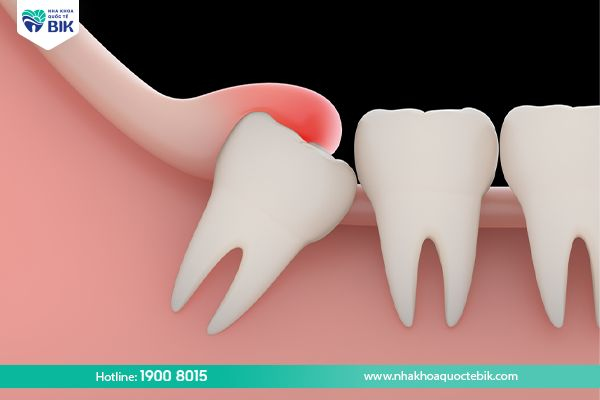
3.5. Lack of nutrients
Lack of essential nutrients for the body, especially lack of vitamins B and C can cause swollen gums. Vitamin C plays an extremely important role in maintaining and restoring the health of the gums. If not supplemented Too much vitamin C can lead to scurvy. Swollen and bleeding gums are two of the symptoms of this disease.

3.6. Other causes
In addition to the common causes of swollen gums above, this condition can also be caused by a few less common causes causes, such as:
– Using dentures that do not fit properly causes gum irritation.
– Taking certain medications with side effects.
– Having certain systemic diseases such as diabetes.
< p style=”text-align: justify;”>- Having periodontal disease.
4. What to do if your gums are swollen?
Depending on the swelling and pain of the gums, appropriate measures will be taken:
4.1. Home Treatment
If your gums are slightly swollen and painful, you can try a few home remedies to reduce the swelling:
< p style=”text-align: justify;”>- Rinse your mouth with saline or diluted saline to remove bacteria in the oral cavity. Note that the saline should not be too salty. or too diluted.
– Brush your teeth properly combined with gentle flossing. When performing, be careful and gentle to avoid damaging the swollen gums.
– Drink plenty of water because water will help stimulate saliva production, which helps weaken disease-causing bacteria in the oral cavity.
– Limit agents that irritate teeth such as rinsing too hard, using alcoholic beverages and tobacco.
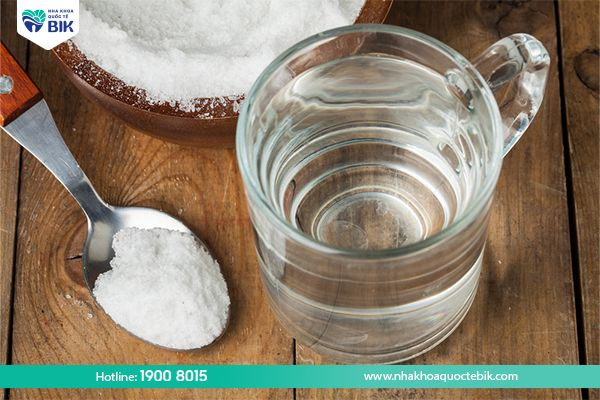
4.2. Dental treatment
If the swollen gums are too severe, causing severe and prolonged pain or home remedies do not relieve the swollen gums, visit a dental facility for thorough treatment. Here, doctors will conduct a general examination and may order an X-ray or blood test (if necessary) for the most accurate diagnosis.
Depending on the cause of the disease, the dentist may prescribe a mouthwash to prevent and reduce plaque or may use antibiotics if necessary. One treatment method is scaling and root planing. This helps clean plaque and tartar so that the gums can recover. In some severe cases, the dentist may prescribe surgery.
5. Methods to prevent swollen gums
To prevent swollen gums, you should note the following:
– Brush your teeth at least twice a day, especially after each meal to remove food plaque.
– Use a soft-bristled toothbrush with moderate brushing force to avoid damaging the gums.
– Replace your toothbrush every 3-4 months to avoid bacteria buildup.
– Use appropriate toothpaste and mouthwash to help keep your teeth strong.
– Combine the use of dental floss to remove food debris between teeth, avoiding damaging the gums.
– Maintain a healthy diet A scientific diet, supplemented with all the necessary vitamins and minerals, helps increase resistance and helps the body fight harmful bacteria. Pay special attention to vitamin B and C supplementation
– Visit the dentist regularly at least once every 6 months to ensure regular oral health checks.

So swollen gums can be caused by many different reasons, including swollen gums due to inflammation, pregnancy, wisdom teeth, etc. Although this is not a dangerous disease, it is dangerous, but if not treated promptly, it can still cause more serious complications such as periodontitis. Therefore, when you encounter this condition, you can choose BIK International Dental Clinic as a reliable treatment place with a team of specialized and highly skilled doctors.


